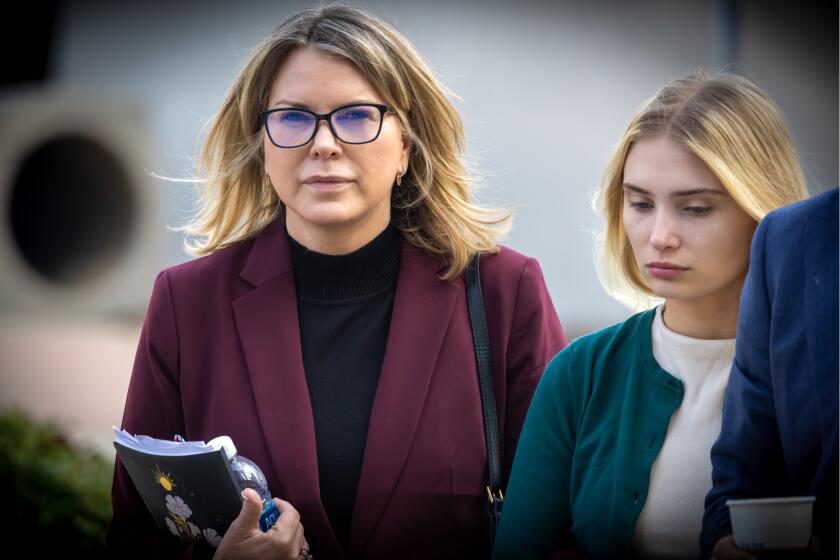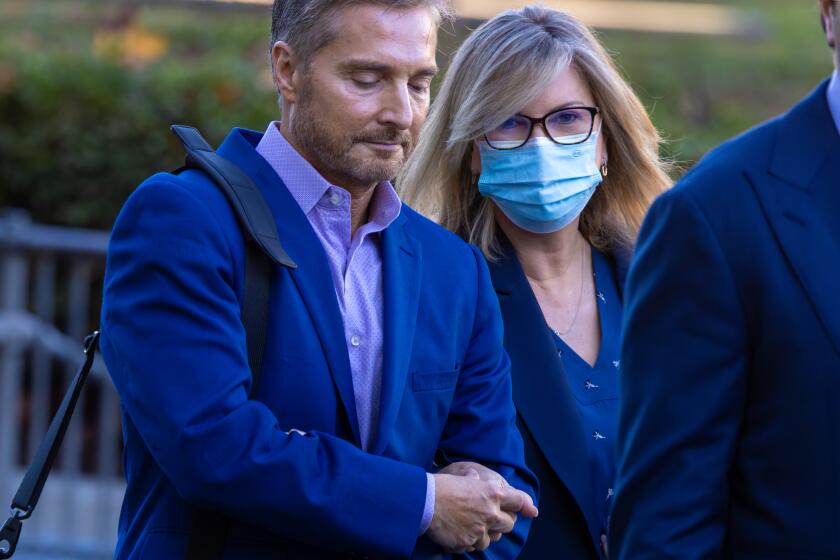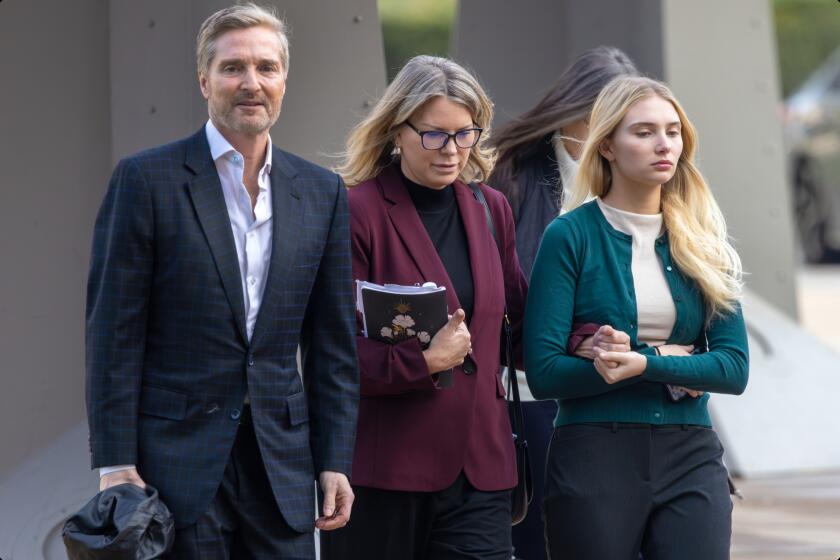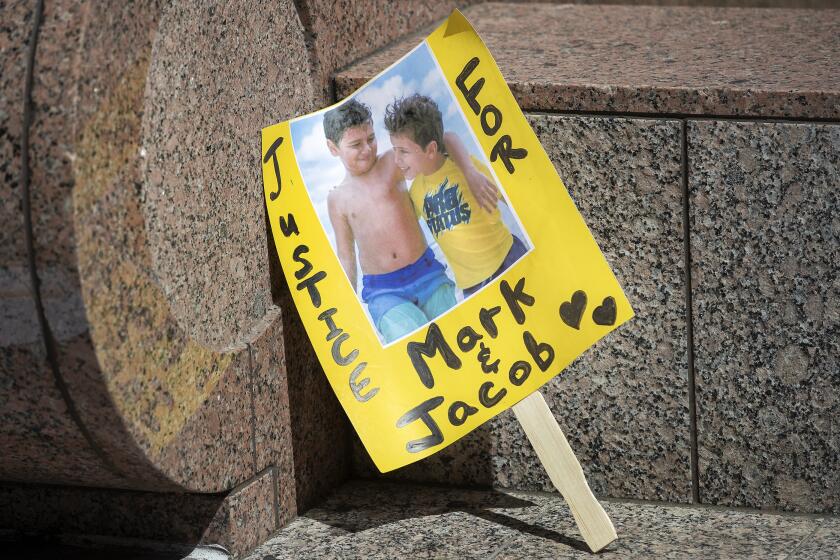Rebecca Grossman ‘naive,’ not conniving, with jailhouse calls; judge won’t reprimand her
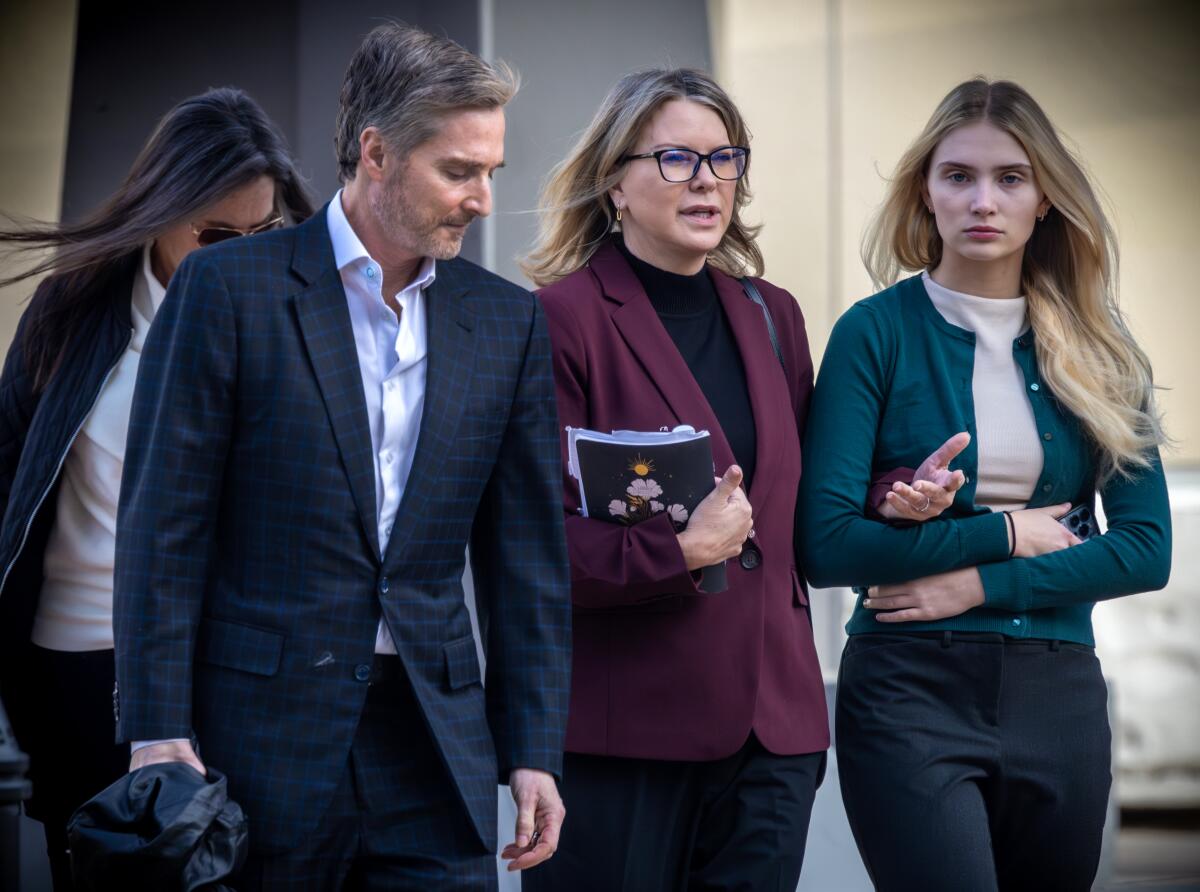
- Share via
Convicted murderer Rebecca Grossman’s jailhouse telephone antics aren’t worthy of any sanctions, a judge ruled Friday, calling her actions the result of “naivety” while agreeing to delay her sentencing by two additional months.
Prosecutors had sought to have Grossman’s jailhouse privileges revoked after a series of recorded telephone calls from the Twin Towers jail to her family instructed them to release evidence that had been sealed during her double murder trial and to track down witnesses to get them to say their testimony was directed.
Grossman has been awaiting sentencing since her Feb. 23 conviction of second-degree murder in the deaths of two brothers who were struck and killed in a crosswalk as she sped along a residential Westlake Village street in September 2020.
But Los Angeles County Superior Court Judge Joseph Brandolino refused to move Grossman to a part of the jail system where her mail is checked and she would have no access to phones or visitors, except for her attorneys, saying the punishment wasn’t necessary.
“I don’t see this as witness tampering. This is someone who believes she was railroaded,” Brandolino said during a hearing. “She is upset, and she is naive.”
Dept. Dist. Atty. Jamie Castro, however, took exception to the judge’s view, saying the calls were not the words of a naive woman but one who was trying to influence witnesses and blatantly violate a court order.
Castro noted that an hour and 15 minutes after the verdict against Grossman was read, she placed a call to her daughter to release video evidence from the trial.
“She has had 10 attorneys by my count” and spent four years in the court system, the prosecutor said. “She knows better. To characterize it as naivety isn’t good enough.”
In a motion filed Monday, prosecutors say the convicted murderer used jailhouse phones to direct her family to release evidence that had been sealed and to track down witnesses to get them to say their testimony was directed.
Grossman’s new legal team, led by Samuel Josephs, an appellate lawyer who focuses on white-collar criminal matters, argued that his client is in solitary confinement and her calls and visitors are her only real contacts with the outside world.
In denying the motions filed this week by Castro and Deputy Dist. Atty. Ryan Gould , Brandolino warned Grossman’s new defense lawyers that going forward, any release of evidence under seal would result in financial sanctions for them and he would report them to the state bar.
According to court documents, a conversation that Grossman had with her daughter, Alexis, included instructions for the young woman to make public a deputy-worn body-camera video that had been sealed by Brandolino during trial.
“I want you to unblock the videos,” Grossman tells her daughter in a call on Feb. 23, the day of her guilty verdict on two counts of murder, two counts of gross vehicular manslaughter and one count of hit and run in the deaths of Mark and Jacob Iskander, ages 11 and 8.
Alexis Grossman replies, “I will.”
Dr. Peter Grossman, Rebecca Grossman’s husband, then interjects: “Everything you want us to put out, honey, let us know. We’re going to put it all out.”
To which Grossman replies: “I want you to put everything out.”
John Hobson, another of Grossman’s new attorneys, told the judge Friday that she did not understand the seal on evidence was still in place after the trial had ended when she directed her daughter to put up the video.
The prosecution has rested and the defense will begin presenting its case this week in the murder trial of Rebecca Grossman, charged in the deaths of two young boys in a traffic collision in Westlake Village.
In another jailhouse phone call last month, Grossman suggested that witnesses should be tracked down and made to say their testimony was directed.
“If we can get witnesses to come forward and say they were told to say things, this can get us a new trial,” Grossman said.
Her 19-year-old daughter replied: “I’m going to do everything for you, Mom. Everything. And so is Dad.”
Earlier this week, Gould and Castro alleged that Grossman’s legal team had also attempted to tamper with jurors, including a private investigator contacting jury members and not properly identifying himself as working for the defense.
The prosecutors said the only way the investigator could have found the jurors was if he had access to their personal information, which was sealed by Brandolino, as is procedure in California after a verdict.
In a motion filed Thursday, the prosecutors alleged that a juror had come forward to complain that despite jury members being told that their identities were protected, a private investigator working for Grossman had attempted to question him outside his home about how the jury reached its verdict.
Juror Number 7 sent an email to Gould stating that a private investigator came to their home March 11.
“He came to my house looking for me personally,” the juror wrote. “He introduced himself, gave me his card and told me out front that I didn’t have to talk to him if I didn’t want to and then asked if he could talk to me about the Grossman trial. I asked him why, and he told me he was working for the Grossman family and wanted to know more about what in the trial influenced the jury in their decision. I told him I won’t talk to him, and he left.”
The prosecutors said the only way the investigator, identified as Paul Stuckey, could have found the jurors was if he had access to their personal information, which was sealed by the judge, as is procedure in California. The defense may petition the court for a juror’s identity if a compelling interest is shown, but that has not been done in this case, they said.
“It is clear that the jurors in this case believed that their information would remain private and that they would not be contacted without having been given notice,” Gould and Castro wrote in the latest filing.
The prosecutors asked the court for all such information to be returned, and Brandolino ordered the defense team to destroy any juror names or other information obtained during trial and not to contact jury members further.
The judge said that while he did not view the efforts to speak with jurors as tampering or harassment, he did believe it was a technical violation of the rules that protect jurors’ identities.
And he warned that if the court perceived Grossman or her attorneys were tampering with witnesses in the future, he would restrict her jail contact privileges.
An L.A. County prosecutor told jurors there is overwhelming evidence that Grossman committed murder by striking two boys as she raced her SUV through a crosswalk.
Grossman’s lawyers also successfully petitioned the judge to delay her sentencing, which had been scheduled for April 10. She is facing 34 years to life in prison.
Josephs asked the court that Grossman’s sentencing be moved to June 10, saying his partner, James Spertus, would be handling a motion for a new trial and needed time to review the voluminous court record.
Prosecutors objected to the continuance, arguing that the defense had done nothing for the past month since Grossman’s conviction and that she has now had “seven or eight attorneys.”
But Brandolino said that given the numerous trial motions, such a delay was reasonable.
With the Rebecca Grossman case in the hands of the jury, will it view her as a killer or see something more nuanced in the tragic events of that evening in Westlake Village three years ago?
Defense attorney Lara Yeretsian — whose clients have included Scott Peterson, who was convicted of the murder of his pregnant wife and is now backed by the Los Angeles Innocence Project, a nonprofit legal group with a reputation for exonerating wrongfully convicted criminals — said inmates should never discuss the facts of their case with anyone but their lawyers.
“Unfortunately, it looks like Rebecca Grossman missed the lecture on this rule, especially when she asked her daughter on a recorded line to leak a video that was excluded from evidence at trial,” Yeretsian said. “Although most lawyers regularly remind their clients of the rule so they don’t slip up, inmates count on their conversations going unnoticed. But in a high-profile case like the Grossman case, nothing goes unnoticed.”
Louis Shapiro a well-known L.A. defense attorney, said Grossman doesn’t have much to lose, so speaking out is a calculated risk.
When “you are facing pretty much a life sentence, the motion for a new trial is your only hope,” he said. “She sees it as the ends justify the means.”
